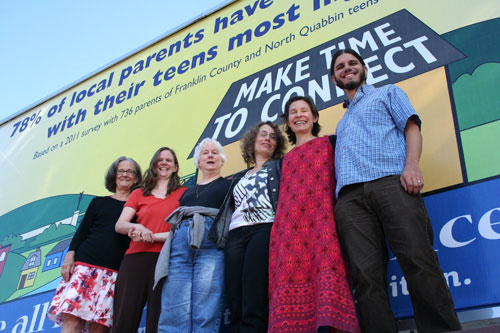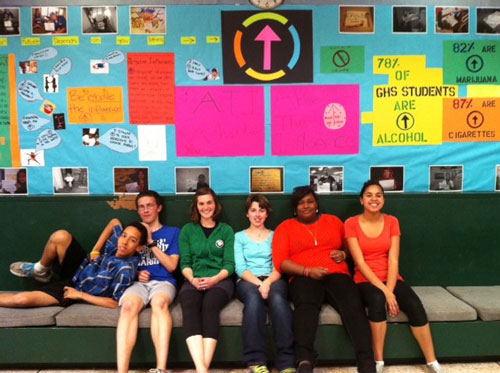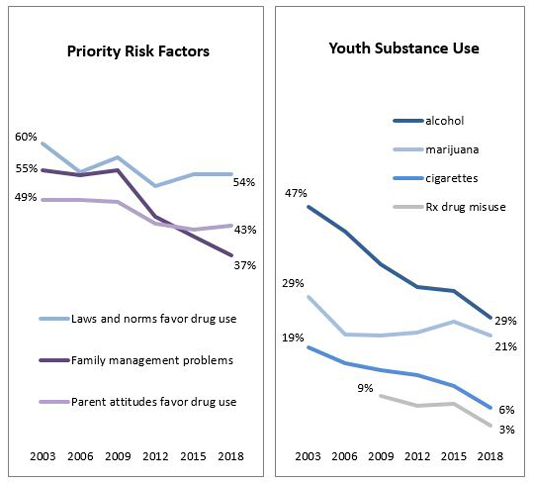Communities that Care Coalition
- Need: To improve the health and well-being of young people in the rural area of Massachusetts's Franklin County and North Quabbin, and to reduce youth drug and alcohol use.
- Intervention: A community-based prevention coalition was formed to improve youth health and well-being and reduce youth drug and alcohol use. The coalition brings together stakeholders from across the community and uses the Communities That Care evidence-based community planning system.
- Results: CTC has seen significant reductions in substance abuse among local youth in the 30 rural towns they serve.
Evidence-level
Promising (About evidence-level criteria)Description
The Communities That Care Coalition (CTC) of Massachusetts's predominately rural areas of Franklin County and the North Quabbin Region began out of a concern for their area's youth. In 2002, a group of community members gathered to discuss effective ways to address substance abuse that had become prevalent among teenagers. Since then, concerned youth, parents, schools, community agencies, and local governments have united to promote the health and well-being of young people by combating substance misuse through CTC.

The Coalition is based on the national Communities That CareTM model, an evidence-based, prevention initiative that builds community capacity to implement evidence-based programs, policies, and practices. Their model was designed to be replicated on a local level.
CTC operates through a Collective Impact Model, engaging with community agencies to work toward preventing harmful behaviors and promoting positive youth development through these work groups:
- Parent and Family Engagement Workgroup - works to improve the connection between the Coalition and agencies that work with families and youth. Includes 10 paid Parent Leaders representing different family-serving agencies.
- Regional School Health Task Force - connects the Coalition to the 9 public school districts in the area.
- Regional Policy and Norms Workgroup - consists of health department personnel, town and state officials and elected representatives, law enforcement, and those involved in creating and enforcing policies.
- Community Supports for Young People Workgroup - works to enhance community services for youth and young adults and to connect young people to community services.
- Infant and Early Childhood Mental Health Roundtable - includes community organizations, providers, parents, professionals and allies representing educational, mental health, pediatric, social service, early intervention and other support services.
- Grand Rising Workgroup - brings together coalition and community members with a common interest in improving youth health and well-being for all youth.

CTC is co-hosted by Community Action and the Healthy Youth Partnership at the Franklin Regional Council of Governments. Several dozen partners have contributed to CTC's success. CTC includes more than 400 members with representation from local government, businesses, schools, law enforcement, faith-based organizations, media, hospitals, mental health providers, parent advocates, and youth.
In 2002, a federal Drug Free Communities grant, distributed by the Substance Abuse and Mental Health Services Administration, provided the initial funds to run the program for several years. In addition, CTC has raised more than $5 million over the last 13 years toward the program's efforts.
This video explains more about CTC Franklin County and the North Quabbin Region.
Services offered
The CTC system is data-driven and evidence-based and uses information collected about local youth to identify areas of need and measure the program's success. Every year since 2003, they have conducted a Student Health Survey to evaluate high school students' risky behaviors and underlying risk factors.
The Coalition publishes and maintains a Community Action Plan for reducing youth substance use and improving youth health in the region. The plan is updated regularly by the coalition's workgroups based on updated local data and community input.
Core to the coalition's work is integrating youth and parent voices into their efforts. They have worked to secure funding to recruit, train, and pay 10 Parent Leaders and 14 Youth Leaders who bring their voices to the coalition and bring the coalition's programs and messages to the community.
CTC works with area schools to help them integrate evidence-based substance-use prevention and mental health promotion programs such as the Botvin LifeSkills Training for middle school students, the PreVenture program, Screening, Brief Intervention, and Referral to Treatment (SBIRT) and Restorative Practices in Schools.
The coalition has a significant policy effort – working on influencing local, state, and federal policies that affect youth health. This includes everything from regulations on cannabis advertising to cell phone policies in schools to education funding reform.

CTC's Parent Education Workgroup helps support member agencies working on family education efforts. The funds provide evidence-based training for parents and child caregivers, as well as efforts that strengthen family connection.
Results
Thirty rural towns in Franklin County and the North Quabbin have benefited from CTC. Since the program's launch in 2002, Franklin County and the North Quabbin Region have seen significant reductions in substance abuse in local youth and reductions in the coalition's priority risk factors:

The Coalition has advocated for change on a local and national level and has received recognition for its innovation and accomplishments:
- Several additional high-profile articles were published on Collective Impact highlighting CTC's work: Channeling Change: Making Collective Impact Work, Stanford Social Innovation Review (2013); Embracing Emergence: How Collective Impact Addresses Complexity, Stanford Social Innovation Review (2013); and How Public Policy Can Support Collective Impact, Collective Impact Forum (2015)
- In 2016, the National Academy of Medicine published a discussion paper entitled The Communities That Care Coalition Model for Improving Community Health through Clinical–Community Partnerships: A Population Health Case Report.
- CTC Coalition Coordinator presented at the White House Summit on prevention in education in June, 2014.
- In 2009, the Massachusetts Department of Public Health awarded CTC its "Healthy Communities Principles Award."
- In 2008, CTC Co-Chair Kat Allen received CADCA's "Advocate of the Year" award.
- In 2007, CTC was named "Coalition of the Year" by Community Anti-Drug Coalitions of America (CADCA).
Challenges
Finding and sustaining funding in a low-income rural community has consistently been the greatest challenge for the Coalition, particularly as federal dollars have come and gone. CTC tries to handle this challenge by braiding different funding streams to provide the most consistent services to the community.
Replication
CTC has become a mentor site to sister coalitions across the state. Below are some principles they suggest for those who are interested in starting something similar:
- Secure community involvement and support before launching the program. With programs like this, the buy-in from local stakeholders is necessary. Seek out those who share a similar mission and are already taking steps to build up their youth. Involve youth voice and community voice from the start. Value lived experience and center the voices of people whose voices have traditionally been silenced.
- Create boundaries. Prioritize the greatest needs of your area's youth and focus on those first. While you should limit your service area to be a manageable size, be willing to expand your boundary lines as your capacity allows.
- Develop your strategic framework. Keep it simple, but comprehensively outline the issues that need addressing and your plans to achieve improvement.
Contact Information
Kat Allen, Co-ChairCommunities that Care
413.774.3167
KAllen@frcog.org
Topics
Children and youth
· Community engagement and volunteerism
· Substance use and misuse
· Wellness, health promotion, and disease prevention
States served
Massachusetts
Date added
May 5, 2016
Suggested citation: Rural Health Information Hub, 2025 . Communities that Care Coalition [online]. Rural Health Information Hub. Available at: https://www.ruralhealthinfo.org/project-examples/902 [Accessed 13 February 2026]
Please contact the models and innovations contact directly for the most complete and current information about this program. Summaries of models and innovations are provided by RHIhub for your convenience. The programs described are not endorsed by RHIhub or by the Federal Office of Rural Health Policy. Each rural community should consider whether a particular project or approach is a good match for their community’s needs and capacity. While it is sometimes possible to adapt program components to match your resources, keep in mind that changes to the program design may impact results.
